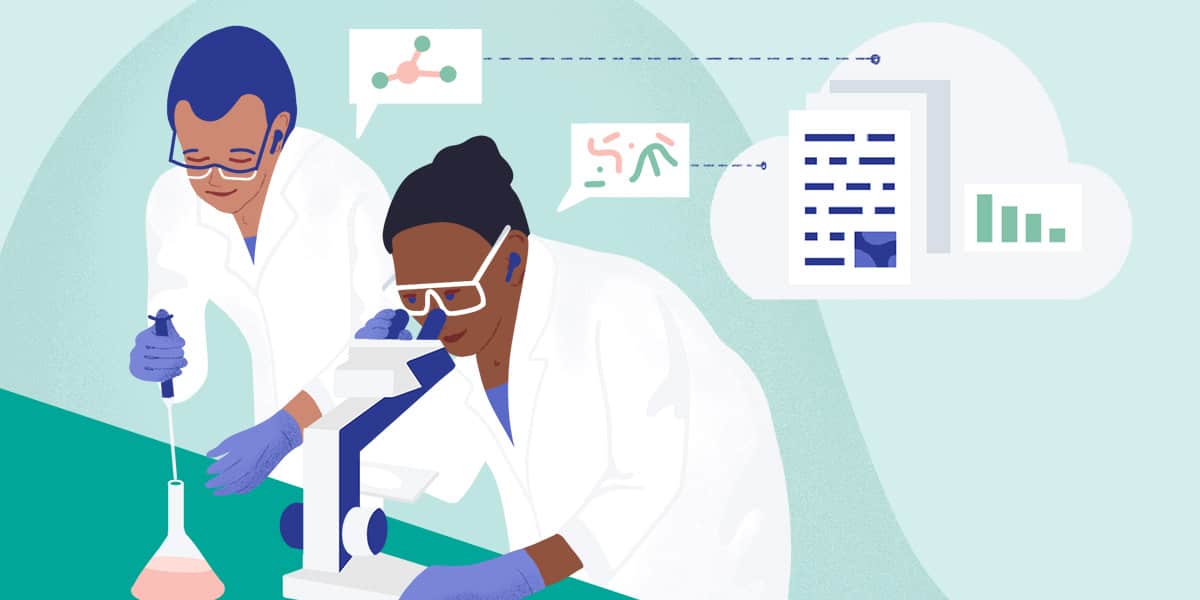With cloud technology, pharma companies can leverage big data, automation and advanced analytics to create nimble, collaborative processes. In a recent interactive roundtable, experts from Bayer, Cytiva and LabTwin discussed how cloud technology allows companies to process huge R&D datasets, streamline preclinical and clinical research, comply with regulatory guidelines and reduce costs.
THE CLOUD IN PHARMA RESEARCH
Pharma companies can use cloud technology to break down data silos, scale R&D strategies, and securely store, share and control data (Fig.1).
Large multinational or multisite companies face significant challenges when harmonizing data collected by different people in various labs, sometimes in different languages. With the cloud, companies can unify and define data labeling and structuring processes and thus harmonize their data. This limits variation between different instruments and locations.
The sheer volume of data generated within R&D labs is another major challenge for pharma companies. Cloud technology can help companies unlock the value in huge datasets collected over many years. The cloud can also help companies abide by regulatory guidelines by keeping data within certain geographic locations while still permitting in-depth analysis.
“The amount of high-content data generated in pharma is growing exponentially,” said Nicolas Bernsmeier, Digital Lead Pharma Research at Bayer. “Cloud scalability helps manage this data. Large computing power can scale up and bring algorithms to the data, rather than the other way round. This is not possible with other systems.”
Moreover, cloud technology facilitates data sharing with partners, CROs and other service providers.
“Access management is much easier in the cloud than in the closed environment of siloed data centers,” said Nicholas Bernsmeier.
“In many companies, data is very siloed – some data is located
with the analytical instruments, some with quality control, some
with operations – all with diverse labeling and structuring. The
goal is to coordinate data company-wide with a systematic and universal approach.”William Whitford - Strategic Solutions Leader, Cytiva
CHALLENGES AND OPPORTUNITIES OF CLOUD COMPUTING
Data security, regulatory compliance, data access and implementation costs are some of the major concerns people have when thinking about adopting cloud technology (Fig.2). A poll of webinar attendees found that 53% of respondents were most worried about data security in the cloud.

The cloud provides one single point for all security events. It is very easy to see who accessed which data, and how that data was used. Furthermore, companies can choose to use only cloud technologies certified by ISO, and compliant with HIPAA, GDPR and other regulatory guidelines. This streamlines the audit process.
“It’s very important to maintain data security while a company changes and grows,” said William Whitford.
The key to successfully adopting cloud technology, according to our expert panel, is to generate a plan – think about the departments generating data, who needs to access it, as well as when and how that access will happen.
“Often data security and compliance are intertwined. Data sharing drives
innovation but you still have to be secure and compliant. The cloud can
really help with this. With cloud technology, companies can configure the
data region where data should stay. Companies can also standardize the way
they manage security by writing access rules directly into programming code
so permissions will always be given correctly and quickly.”Jonas Kulessa- Head of Engineering, LabTwin
LAB AUTOMATION VIA CLOUD COMPUTING
Lab automation, digitization and cloud technology can all reduce R&D costs (Fig.3). Unlike other industries, it is very expensive to create pharmaceutical R&D data. To maximize the value of these data, companies must generate and capture all possible data points. Improved data capture has the added benefits of streamlining workflows and facilitating troubleshooting efforts.

The cloud offers the structure needed to access or input data from many sources. For example, it is possible to automate temperature, humidity and instrument calibration measurements inside different labs. The system can then tell a scientist whether the humidity is too high for a particular substance, or whether a balance has not been calibrated. In this way, the cloud can help manage the myriad parameters in a lab environment.
“As people say, data is the new gold,” said Jonas Kulessa. “With AI and machine learning you can create valuable insights from data in real time. The first step is always to get the right data. The next step is to make sure the right people can access it live.”
“If you can’t use data, it is wasted. At Bayer, we are currently extracting
data from our chemical lab journals. We can only easily reuse 30% of the
legacy data from our 9 million experiments, otherwise we have to manually
curate it or it is wasted information on pieces of paper. Every machine in
our lab is connected now – people can see how their experiments are running
from their office.”Nicolas Bernsmeier - Digital Lead Pharma Research, Bayer
CLOUD COMPUTING IN THE LAB OF THE FUTURE
Cloud technology is likely to play a central role in the Lab of the Future by automating data collection from multiple sites and harmonizing data structure across companies, partnerships and collaborations. The cloud is efficient and scalable so companies can quickly and easily scale up or scale back data management processes as projects start and end (Fig.4). The ability to be nimble in data management will ultimately accelerate research timelines and reduce costs.

“The cloud is a game changer. Cloud technology is made for interoperability –
hundreds of different services can interact together. This helps IT organizations
cope with the constant pressure of introducing new services and connecting
different systems.”Jonas Kulessa - Head of Engineering, LabTwin
The capabilities of the cloud will only grow and improve in the future.
“We are in a very dynamic time. Data storage and transmission is changing dramatically, computing power is increasing exponentially, the algorithms we use on these datasets are continually improving,” said William Whitford. “Pharma companies will see significant growth and savings with cloud technology because it is powerful and effective.”
Watch the webinar to learn more about how cloud technology can streamline data management, reduce costs and improve regulatory compliance.




